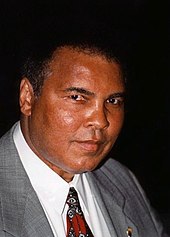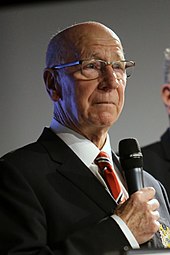BBC Sports Personality of the Year
It was presented by Gary Lineker and formed part of a public vote to determine a special Golden Sports Personality of the Year.
Sebastian Coe picked up a Special Gold Award in 2005 for his work in helping Britain obtain the right to host the 2012 Olympics.
The BBC's Sports Personality of the Year was created by Paul Fox, who came up with the idea while he was editor of the magazine show Sportsview.
The first award ceremony took place as part of a special gala edition of Sportsview held at the Savoy Hotel on 30 December 1954.
[26] The ceremony was combined with two other awards, the sportsman and sportswoman of the year, which were determined by votes through the Sporting Record newspaper.
[29] Voting for the BBC award was by postcard, and rules presented in a Radio Times article stipulated that nominations were restricted to athletes who had featured on the Sportsview programme since April.
For the inaugural BBC Sportsperson of the Year award, 14,517 votes were cast and Christopher Chataway beat fellow athlete Roger Bannister.
During the 1970s Bough and Coleman presided over the ceremony alongside Jimmy Hill,[37] Cliff Morgan,[38] Kenneth Wolstenholme,[38] and Harry Carpenter, who also went on to present the show until 1985.
[42] However, the BBC deemed this to be against the rules and refused to acknowledge his votes,[43] allowing athlete Liz McColgan to win the award.
Sue Barker presented the show for the first time in 1994,[44] at which racing driver Damon Hill won the first of his two awards, the second coming two years later.
[49][50] Leading up to the anniversary show on 14 December 2003, a series of five half-hour special programmes, entitled Simply The Best – Sports Personality, were broadcast.
Hosted by Gary Lineker, the episodes were shown on BBC One for five consecutive nights from 8–12 December 2003; each covered one decade of Sports Personality history.
In 2014, the ceremony was held in Scotland for the first time in its history, at The SSE Hydro in Glasgow, which had served as a host venue during the Commonwealth Games earlier in the year.
Despite the national COVID-19 restrictions, the event was broadcast live on BBC One and hosted by Lineker, Balding, Gabby Logan and for the first time, Alex Scott.
Boxer Tyson Fury created controversy ahead of the awards by rejecting his nomination and instructing his legal team to force the BBC to exclude him from the shortlist.
Leeds became champions of the Football League First Division that season, having lost only two games and scored a record number of points.
[81] In 1981, to recognise the year of the disabled, Dennis Moore received a Special Achievement Award for completing the inaugural London Marathon despite being blind since birth.
[84] Comedian David Walliams received the award in 2006 "for his outstanding achievement of swimming the English Channel for charity", which raised over £1 million for Sport Relief.
[89] In 1986, a Special Team Award was presented to the British 4 × 400m squad of Derek Redmond, Kriss Akabusi, Brian Whittle, Roger Black, Todd Bennett, and Phil Brown, who won gold at the European Championships.
Muhammad Ali accumulated more votes from BBC viewers than the combined total of the five other contenders: Pelé, George Best, Donald Bradman, Jack Nicklaus, and Jesse Owens.
[96] In 2005, Sebastian Coe received a Special Gold Award for chairing London's winning bid for the 2012 Summer Olympic and Paralympic games.
[97] In 2020, Marcus Rashford received an Expert Panel Special Award for his campaign for free school meals during the COVID-19 pandemic and against child food poverty.
[103][104] In the lead up to the anniversary show on 14 December 2003, a series of five half-hour special programmes, entitled Simply The Best – Sports Personality, were broadcast.
Hosted by Gary Lineker, the episodes were shown on BBC One for five consecutive nights from 8 to 12 December 2003 and each covered one decade of Sports Personality.
The other members of the shortlist were footballer Bobby Moore, cricketer Ian Botham and ice skating duo Torvill and Dean.




